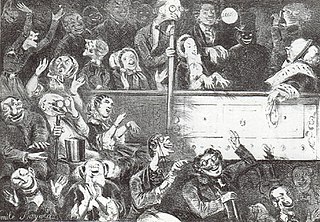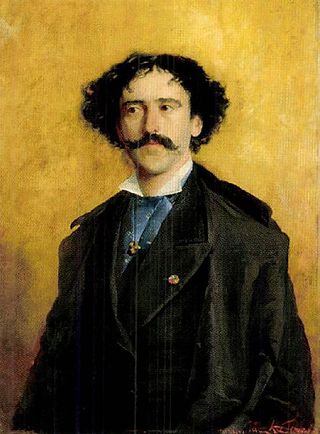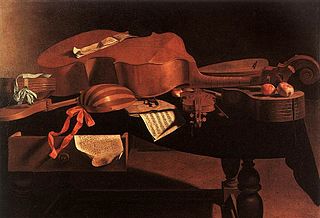External links
- La Mantilla, Aragonaise by Denis Wright
In a musical context, an Aragonaise (literally a person or thing from Aragon, a region in Spain) is a "dance of Aragon". This is a driving triple metre dance which is traditionally accompanied by guitars, castanets and hand clapping.
There are two famous musical compositions named "Aragonaise", one by Jules Massenet from his opera Le Cid , the other from the entr'acte to act 4 of the opera Carmen by Georges Bizet.

Musical theatre is a form of theatrical performance that combines songs, spoken dialogue, acting and dance. The story and emotional content of a musical – humor, pathos, love, anger – are communicated through words, music, movement and technical aspects of the entertainment as an integrated whole. Although musical theatre overlaps with other theatrical forms like opera and dance, it may be distinguished by the equal importance given to the music as compared with the dialogue, movement and other elements. Since the early 20th century, musical theatre stage works have generally been called, simply, musicals.

Operetta is a form of theatre and a genre of light opera. It includes spoken dialogue, songs, and dances. It is lighter than opera in terms of its music, orchestral size, length of the work, and at face value, subject matter. Apart from its shorter length, the operetta is usually of a light and amusing character. It sometimes also includes satirical commentaries.

In Spain, music has a long history. It has played an important role in the development of Western music, and has greatly influenced Latin American music. Spanish music is often associated with traditional styles such as flamenco and classical guitar. While these forms of music are common, there are many different traditional musical and dance styles across the regions. For example, music from the north-west regions is heavily reliant on bagpipes, the jota is widespread in the centre and north of the country, and flamenco originated in the south. Spanish music played a notable part in the early developments of western classical music, from the 15th through the early 17th century. The breadth of musical innovation can be seen in composers like Tomás Luis de Victoria, styles like the zarzuela of Spanish opera, the ballet of Manuel de Falla, and the classical guitar music of Francisco Tárrega. Nowadays commercial pop music dominates.

Chinese Opera is a form of theatre in China that combines singing, acting, and elaborate costumes. Topics are based on Chinese history, mythology, and literature. Over its historical evolution, it has incorporated various art forms such as music, song and dance, martial arts, acrobatics, costume and make-up art, and literature. It has highly formalized roles, performed by professional actors each trained for specific roles. Exaggerated features and colors make the roles easily identifiable.

The music of Catalonia comprises one of the oldest documented musical traditions in Europe. In tandem with the rest of Western Europe, it has a long musical tradition, incorporating a number of different styles and genres over the past two thousand years.

The Carmen Fantasy, Op. 25, by Pablo de Sarasate is a fantasy on themes from Bizet's Carmen for violin and piano or orchestra, composed in 1881. A version with piano accompaniment was published in 1882. It was dedicated to Joseph Hellmesberger.

A ballroom or ballhall is a large room inside a building, the primary purpose of which is holding large formal parties called balls. Traditionally, most balls were held in private residences; many mansions and palaces, especially historic mansions and palaces, contain one or more ballrooms. In other large houses, a large room such as the main drawing room, long gallery, or hall may double as a ballroom, but a good ballroom should have the right type of flooring, such as hardwood flooring or stone flooring .. For most styles of modern dance, a wooden sprung floor offers the best surface.
Orquesta Aragón is a Cuban musical band formed on 30 September 1939, by Orestes Aragón Cantero in Cienfuegos, Cuba. The band originally had the name Ritmica 39, then Ritmica Aragón before settling on its final form. Though they did not create the Cha-cha-cha, they were arguably the best charanga in Cuba during the 1950s and 1960s. Their trade-marks included high-class instrumentalists playing in tight ensemble style, and rhythmical innovations which kept their sound up to date. Over the years they progressed from their start as a danzoneria to play a wider variety of styles, danzón, then cha-cha-cha, then onda-cha, pachanga and son fusions. They still perform today, based in Havana.

Graus is a village in the Spanish province of Huesca, located in the Pyrenees at the confluence of rivers Esera and Isabena. It is the administrative capital of the region. It is one of the areas of Aragon in which is still preserved the Aragonese language.

Classical is an album by the guitarist Wolf Hoffmann. It begins with a rendition from Georges Bizet's Carmen, Suite #1 playing the famous Fate Theme from Carmen's opera. Next is a version of Edvard Grieg's "In the Hall of the Mountain King." Track #4 is "Arabian Dance" by Peter I. Tchaikovsky. Ravel's "Bolero" becomes a bluesy piece. The CD's final track is a version of Edward Elgar's "Pomp & Circumstance".

Le Cid is an opera in four acts and ten tableaux by Jules Massenet to a French libretto by Adolphe d'Ennery, Louis Gallet and Édouard Blau. It is based on the play of the same name by Pierre Corneille.

The jota is a genre of music and the associated dance known throughout Spain, most likely originating in Aragon. It varies by region, having a characteristic form in Aragon, Mallorca, Catalonia, León, Castile, Navarre, Cantabria, Asturias, Galicia, La Rioja, Murcia and Eastern Andalusia. Being a visual representation, the jota is danced and sung accompanied by castanets, and the interpreters tend to wear regional costumes. In Valencia, the jota was once danced during interment ceremonies.

Castanets, also known as clackers or palillos, are a percussion instrument (idiophone), used in Spanish, Calé, Moorish, Ottoman, Italian, Mexican, Sephardic, and Swiss music. In ancient Greece and ancient Rome there was a similar instrument called the crotalum. The instrument consists of a pair of concave shells joined on one edge by a string. They are held in the hand and used to produce clicks for rhythmic accents or a ripping or rattling sound consisting of a rapid series of clicks. They are traditionally made of hardwood, although fibreglass has become increasingly popular.

Aragon is a commune in the Aude department in the Occitanie region of southern France.

Baroque music refers to the period or dominant style of Western classical music composed from about 1600 to 1750. The Baroque style followed the Renaissance period, and was followed in turn by the Classical period after a short transition. The Baroque period is divided into three major phases: early, middle, and late. Overlapping in time, they are conventionally dated from 1580 to 1650, from 1630 to 1700, and from 1680 to 1750. Baroque music forms a major portion of the "classical music" canon, and is widely studied, performed, and listened to. The term "baroque" comes from the Portuguese word barroco, meaning "misshapen pearl". The works of George Frideric Handel and Johann Sebastian Bach are considered the pinnacle of the Baroque period. Other key composers of the Baroque era include Claudio Monteverdi, Domenico Scarlatti, Alessandro Scarlatti, Alessandro Stradella, Tomaso Albinoni, Johann Pachelbel, Henry Purcell, Antonio Vivaldi, Georg Philipp Telemann, Jean-Baptiste Lully, Jean-Philippe Rameau, Marc-Antoine Charpentier, Arcangelo Corelli, François Couperin, Johann Hermann Schein, Heinrich Schütz, Samuel Scheidt, Dieterich Buxtehude, Gaspar Sanz, José de Nebra, Antonio Soler, Carlos Seixas and others.
The Golden Mask is a Russian theatre festival and the National Theatre Award established in 1994 by the Theatre Union of Russia. The award is given to productions in all genres of theatre art: drama, opera, ballet, operetta and musical, and puppet theatre. It presents the most significant performances from all over Russia in Moscow in the spring of each year. The first Golden Mask award was given in 1995 presented by Union of Theatre Workers of the Russian Federation.

The Battle of Fraga was a battle of the Spanish Reconquista that took place on 17 July 1134 at Fraga, Aragon, Spain. The battle was fought between the forces of the Kingdom of Aragon, commanded by Alfonso the Battler and a variety of Almoravid forces that had come to the aid of the town of Fraga which was being besieged by King Alfonso I. The battle resulted in an Almoravid victory. The Aragonese monarch Alfonso I died shortly after the battle.

The Carmen Suites are two suites of orchestral music drawn from the music of Georges Bizet's 1875 opera Carmen and compiled posthumously by his friend Ernest Guiraud. They adhere very closely to Bizet's orchestration. However the order of the musical allusions are in reversed chronological order, and do not adhere to the operatic versions entirely, although the Suite is directly inspired by Bizet's opera.

Six is a British musical comedy with music, book, and lyrics by Toby Marlow and Lucy Moss. It is a modern retelling of the lives of the six wives of Henry VIII, presented in the form of a pop concert. In the show, each of the wives take turns telling their story to determine who suffered the most from their common husband.